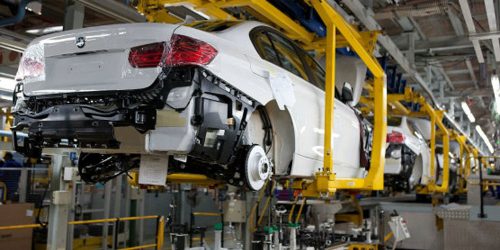ISLAMABAD: The country’s automotive industry has reportedly sought two years to switch over to Euro IV/ V fuel or exclude existing models under production in the country, sources close to Secretary Industries and Production told Business Recorder.
On June 4, 2020, Cabinet Committee on Energy (CCoE) disallowed Oil Marketing Companies (OMC) to import petrol below Euro-V after August 1, 2020. The decision of CCoE was ratified by the federal cabinet on June 23, 2002.
CCoE supported switching over from current Euro-II diesel and petrol to Euro-V standards and observed that it is need of time to adopt Euro-V fuels in the country as many countries have already shifted to Euro-V due to its lesser sulfur content and lower emission, which would ultimately facilitate in reducing negative environmental impact.
One of the top Japanese car assembling companies, in a letter to the Secretary Industries and Production said that currently Pakistan’s regulatory emission requirements under SRO 72(KE) of May 16, 2009 is equivalent to Euro II which provided two-years to automotive industry to change over from Euro Zero to Euro II.
“We understand that due to common White Oil Pipeline Project (WOPP) and awaited facility upgrades at few local refineries, it may not be possible to ensure Euro IV/V fuel at retail stage across Pakistan . Surely, Government would be working to devise mechanisms for assuring fuel quality at retail stage for end users” the company stated.
The company further contended that fuel quality is directly linked with vehicles emissions, fuel efficiencies, engine performance and durability. Often unchartered fuel ingredients/additives like metallic RON boosters result negatively on high tech engine performance. Also, parts supply chain/engineering change management is automotive industry is complex and depend on long-term forecast, therefore, an appropriate lead time is imperative for extensive testing of engine performance based on fuel available at retail stage, the Japanese company stated.
The auto company has assured its support to upgrade Pakistan ambient air quality upgrading vehicles and fuel to Euro IV level. However, considering relationship between fuel quality and automotive vehicles, the company has requested the government to directly engage auto industry in emission/ fuel quality regulatory requirement and share latest status for long-term planning and parts supply chain management and provide sufficient lead time, at least two years, to switch over according to fuel quality available at retail stage across Pakistan or exclude existing models under production within country.
Petroleum Division had recommended partial and full switching over from existing Euro-II diesel and petrol imports to Euro-V standards as per the following schedule: (i) The partial imports of petrol may be initiated from the first week of June, 2020 and subsequently all imports shall conform to Euro-V specifications with effect from 3rd quarter; 2020; Import of petrol below Euro-V specifications may not be allowed to any OMC beyond that deadline;(ii) all imports of diesel may conform to Euro-V specifications with effect from the deadline received from Kuwait Petroleum Corporation i.e. January, 2021.
Import of diesel below Euro-V specifications may not be allowed to any OMC beyond that deadline. PSO may however, import Euro-V diesel from first week of June, 2020 as and when available from KPC, which has indicated that it will start trial production of Euro-V from June, 2020; (iii) current mechanism for marketing of diesel and petrol with regard to pricing and IFEM component shall prevail. Ogra and OCAC shall take further necessary action accordingly; (iv) prevailing pricing formula may continue, i.e., average of 5 days Mean of Platts Arabian Gulf (MOPAG) for Euro-V diesel and petrol centered on B/L date plus premium/freight and incidental charges on actual basis. Pricing of imported Euro-V diesel and petrol would be on the basis of PSO’s actual landed import price;(v) pricing benchmark/mechanism for local refineries for producing ‘diesel and petrol may be based on PSO’s actual landed import price of Euro-V diesel and petrol, as per current practice (already contract has this loss process with a sulfur content penalty factor for diesel/RON a differential penalty for petrol, as is being presently followed. Ogra will finalize the price calculation in this regard, in consultation with oil refineries and PSO, so that any undue advantage to refineries producing below Euro-V standards is avoided; and (vi) comingling/intermixing of imported and locally produced grade by refineries and OMCs may be allowed, as it will improve the overall specification of the product at distribution levels need a timeline to end.
Alternatively, cleaner products could be used more upcountry to reduce the air pollution in the plains where it is more pronounced.
CCoE decided that the process of switching of petrol imports to Euro-V specifications be initiated forthwith. Imports of petrol below Euro-V specifications shall not be allowed to any OMC beyond August 1, 2020.
The government has decided that all imports of diesel shall conform to Euro-V specifications with effect from January 2021. In the interim period, efforts shall be made to import Euro-V, however in case of its non-availability under the long- term agreement with Kuwait Petroleum Company, diesel of Euro-IV specification shall be imported.





